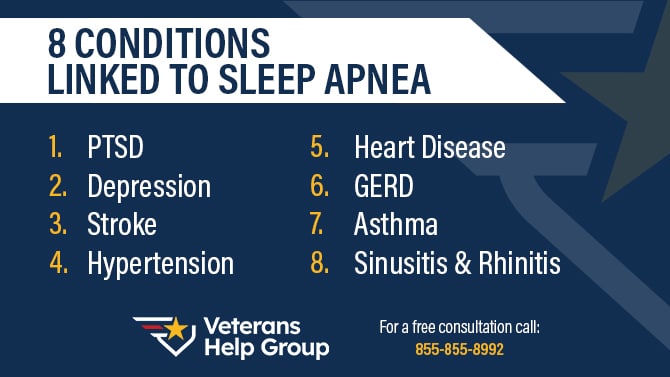
Table Of Contents
8 Conditions That Are Linked to Sleep Apnea
For a veteran who has numerous conditions that are not all service-connected, it is important to consider whether the conditions without “service-connection” should be service-connected secondarily.
A condition is service-connected secondarily when an already service-connected condition, or its medication, causes or aggravates another condition.
Understanding Sleep Apnea and Its Impact on Veterans
Sleep apnea is a serious respiratory condition where breathing stops and starts during sleep, leading to reduced oxygen levels in the blood. The VA recognizes three types of sleep apnea:
- Obstructive Sleep Apnea (OSA), caused by relaxed throat muscles blocking the airway
- Central Sleep Apnea (CSA), resulting from the brain failing to signal breathing muscles
- Complex/Mixed Sleep Apnea, a combination of both.
Veterans are at higher risk due to factors like exposure to toxic burn pits, physical injuries, and psychological conditions such as PTSD. Left untreated, sleep apnea can exacerbate or contribute to numerous health issues, many of which qualify for secondary service connection under VA disability claims.
What are the conditions Linked to Sleep Apnea for VA Disability Claims?
Sleep apnea can either cause or be caused by other service-connected conditions, creating opportunities for veterans to claim secondary service connections. Establishing these links can significantly increase your combined VA disability rating. Below are eight key conditions commonly associated with sleep apnea, supported by medical studies and VA claims data.
If you have sleep apnea and any of the following conditions there may be a link between your service-connected condition and the other condition:
1. PTSD (Post Traumatic Stress Disorder)
Studies indicate that nearly 70% of veterans evaluated for PTSD have an elevated risk for sleep apnea. PTSD can contribute to sleep apnea by causing fragmented sleep patterns or heightened stress, which disrupts breathing regulation. Conversely, sleep apnea’s sleep disruptions can worsen PTSD symptoms, creating a bidirectional relationship. Veterans with service-connected PTSD can file for sleep apnea as a secondary condition, potentially increasing their rating. A nexus letter from a sleep specialist or psychiatrist is critical to establish this connection.
The most common condition that sleep apnea is connected to is PTSD. If you think your sleep apnea is secondary to your PTSD see our previous post “Sleep Apnea Secondary to PTSD”.
2. Depression
People with sleep apnea are four times more likely to have depression than people without a sleeping disorder. Sleep apnea can cause veterans to wake up tired and irritable. Sleeping well is vital for your overall mental health. Inconsistent sleep over a period of time can wear down a person and cause mental health conditions. Many veterans with sleep apnea may develop depression. Studies show that regardless of weight, age, sex, or race, sleep apnea symptoms are associated with the onset of depression.
3. Stroke
Sleep apnea interrupts or stops your breathing while you sleep. This inconsistent intake of oxygen can negatively affect your blood flow, leading to a stroke. The combination of low oxygen levels and high blood pressure also increases the likelihood of future strokes. While sleep apnea can be the cause of a stroke or reoccurring strokes, it can also be an after-effect of a stroke.
4. Hypertension (High Blood Pressure)
Sleep apnea can both cause hypertension and aggravate your pre-existing hypertension. Sleep apnea causes your blood oxygen levels to drop, increasing your blood pressure (causing hypertension). Moreover, hypertension can both cause sleep apnea and worsen it.
The VA recognizes hypertension as a secondary condition to sleep apnea, and veterans with service-connected sleep apnea can claim hypertension if medical evidence supports the link. This connection is critical, as hypertension can lead to further complications like heart disease, which may also qualify for VA benefits.
5. Heart Disease
One study shows that sleep apnea increases an individual’s risk of heart failure by 140%. While studies are not certain about the mechanisms explaining this association, many think that the pressure changes cause stress on the heart because of decreased blood oxygen levels and increased inflammation. Veterans who obtain a sleep apnea rating often qualify to receive benefits for secondarily service-connect heart disease too.
6. Gastroesophageal Reflux Disease (GERD)
Studies show that there is a link between sleep apnea and GERD. This connection is bidirectional, meaning, that while GERD can induce and worsen the effect of this condition, sleep apnea can also induce and worsen the effect of GERD. For example, sleep apnea can change the amount of pressure in an individual’s airway, resulting in reflux. Moreover, when asleep, the way the body clears an individual’s esophagus of acid is impaired, thus the length of time that acid is in contact with the esophagus increases, worsening the effects of GERD. Additionally, acid from GERD can cause spasms of the vocal cords that can induce sleep apnea. (which in turn can further aggravate GERD).
7. Asthma
Sleep apnea is a known aggravator of asthma. Asthma causes inflammation in the lungs. At times, sleep apnea can further increase that inflammation. Additionally, people with asthma have an increased risk of developing sleep apnea.
8. Sinusitis & Rhinitis
Both Sinusitis and Rhinitis are linked bidirectionally to sleep apnea. Individuals with sleep apnea are much more likely to develop chronic sinusitis or rhinitis. Both sinusitis and rhinitis can also aggravate sleep apnea.

What Should I Do If I Have Sleep Apnea and One Another Condition?
If you have sleep apnea and one of the above-listed conditions, your next step would be to get a doctor’s medical opinion (IMO) supporting that your service-connected condition caused or aggravated the other condition. For example, a helpful IMO would be one that explained that it is likely that your service-connected PTSD caused your sleep apnea, or that your service-connected sleep apnea aggravated your GERD.
VA Disability Ratings for Sleep Apnea: Current System and 2025 Changes
Under the current VA rating system (Diagnostic Code 6847), sleep apnea is rated at 0%, 30%, 50%, or 100% based on severity and treatment requirements:
- 0%: Diagnosed but asymptomatic, qualifying for healthcare but not compensation.
- 30%: Persistent daytime hypersomnolence, yielding $537.42/month in 2025.
- 50%: Requires a CPAP machine, providing $1,102.04/month.
- 100%: Chronic respiratory failure, tracheostomy, or cor pulmonale, offering $3,946.25/month.
However, the VA has proposed significant changes to the sleep apnea rating system, expected to take effect as early as April 2025. These changes aim to align ratings with functional impairment rather than treatment methods:
- Elimination of Automatic 50% Rating for CPAP: Veterans prescribed a CPAP will no longer automatically receive a 50% rating. Instead, ratings will be based on symptom severity and treatment effectiveness.
- New 10% Rating: A 10% rating may replace the 30% rating for mild symptoms, significantly reducing compensation.
- Symptom-Based Evaluations: The VA will assess cognitive impairment, fatigue, and cardiovascular complications to determine ratings.
- Functional Capacity Assessments: Ratings may reflect how sleep apnea impacts daily activities and work.
Veterans with existing ratings will be grandfathered into the current system unless they request an increase. New claims filed after the changes may face stricter criteria, making it critical to file now.
[](https://prestigeveteranmctx.com/va-sleep-apnea-rating-changes-in-2025/)[](https://vetvalor.com/proposed-changes-to-va-disability-ratings-for-sleep-apnea-in-2025-what-veterans-should-expect/)
How to Strengthen Your VA Disability Claim for Sleep Apnea
To maximize your VA disability benefits, follow these steps to build a robust claim:
- Obtain a VA-Approved Sleep Study: A polysomnography test is required to confirm sleep apnea. Ensure results document apnea events and treatment needs.
- Establish Service Connection: Provide military service records, nexus letters, and lay statements linking sleep apnea to service or a service-connected condition like PTSD or burn pit exposure.
- Document Symptoms: Keep a journal of daytime drowsiness, concentration issues, or other impairments. Lay statements from family or roommates can corroborate symptoms.
- Identify Comorbid Conditions: Conditions like PTSD, depression, or heart disease can increase your rating if they impede CPAP use or cause organ damage.
- File Promptly: Submit claims before the 2025 changes to secure ratings under the current system.
- [](https://prestigeveteranmctx.com/va-sleep-apnea-rating-changes-in-2025/)Work with a Veterans Advocate: An experienced advocate can help gather evidence, obtain nexus letters, and navigate appeals if your claim is denied.
Why Act Now? The Importance of Filing Before 2025 Changes
The proposed VA rating changes could reduce benefits for many veterans, particularly those relying on a 50% rating for CPAP use. Filing your claim now ensures evaluation under the current, more favorable system. Veterans with pending appeals or claims filed before the changes will also be assessed under the old criteria. Delaying could result in a lower rating and reduced compensation.
Veterans Help Group has been helping veterans get the rating they deserve since 1995. If you suffer from sleep apnea and have any of the above conditions, Veterans Help Group would like to help you get the disability benefits you deserve. Call us at 855-855-8992 or contact us here for a FREE consultation.
The Veterans Help Group website offers several pages with valuable information on sleep apnea and related VA disability claims. Below are links to key pages that provide insights, guidance, and answers to common questions about sleep apnea for veterans seeking disability benefits:
- Sleep Apnea: Understanding the VA Ratings
This page explains how the VA assigns disability ratings for sleep apnea (0%, 30%, 50%, or 100%) based on severity and treatment requirements, such as CPAP use. It also discusses the importance of proving service connection and provides tips for building a strong claim. - Sleep Apnea: Top VA Disability Questions Answered
This resource addresses frequently asked questions about sleep apnea claims, including how to establish service connection, the role of nexus letters, and connections to conditions like asthma, traumatic brain injury (TBI), and cervical spinal injuries. It emphasizes the importance of working with an advocate to navigate the claims process. - Sleep Apnea Secondary to PTSD
This page focuses on how sleep apnea can be claimed as a secondary condition to service-connected PTSD. It highlights the high prevalence of sleep apnea among veterans with PTSD and provides guidance on obtaining medical evidence to support a secondary service connection.

Major Victory: VA Invests Over $800 Million to Fight Veteran Homelessness
Major Victory: VA Invests Over $800 Million to Fight Veteran Homelessness The Department of...

What is the VA DBQ?
What is a VA DBQ? A VA Disability Benefits Questionnaire (DBQ) is a form used to convey medical...

Why Does the VA Deny So Many Veteran Disability Claims?
There are several reasons why the VA denies so many veteran disability claims. Knowing them can help you improve your chances of being approved on your next application or appeal.





